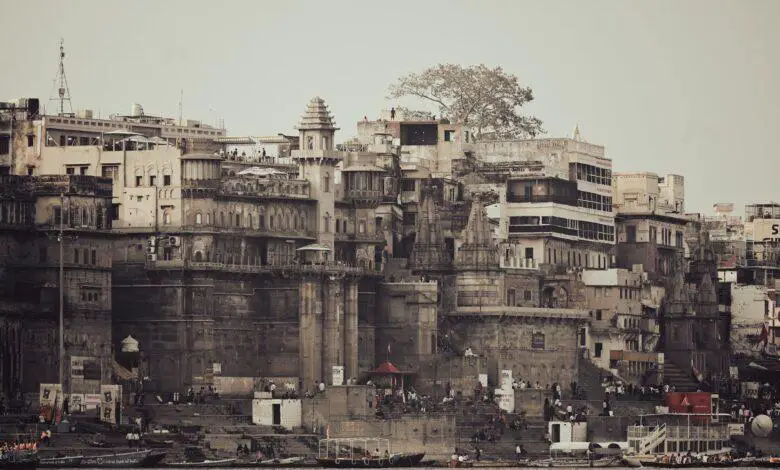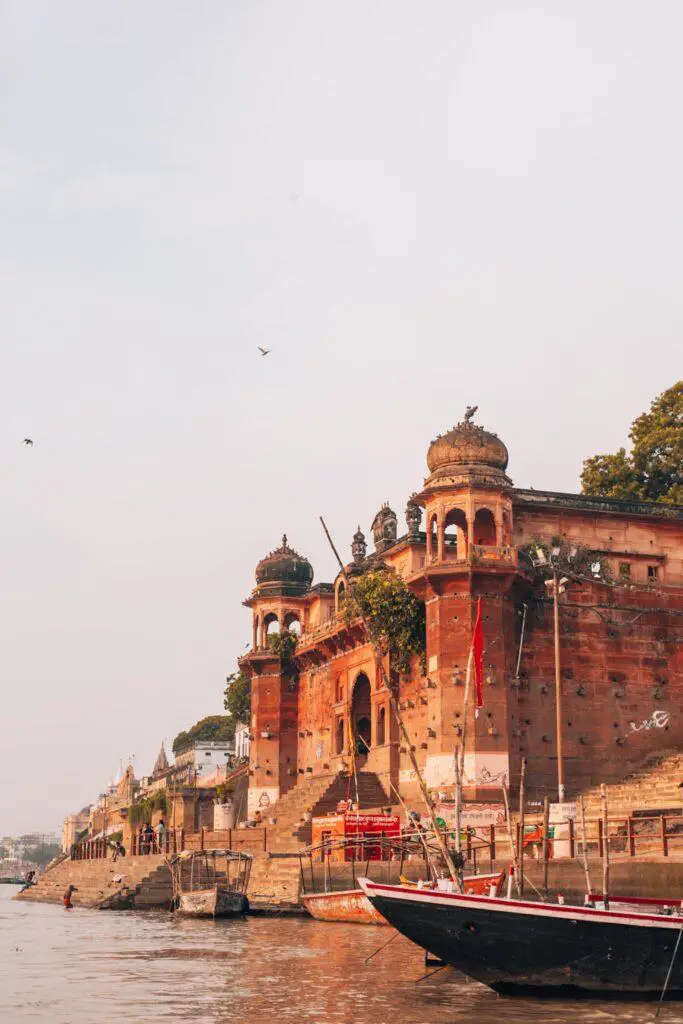🌄🙏 A Spiritual Journey to Varanasi, India: The Holy City 🕊️
Embrace the Sacred Vibes and Cultural Riches of Varanasi

Introduction
Close your eyes and imagine the serene banks of the sacred Ganges River, where the echo of temple bells mingles with the scent of incense, and a sense of spirituality fills the air. Welcome to Varanasi, India, the holiest of cities, where a spiritual journey is more than just a destination; it’s a profound experience.
In this blog post, we will embark on a spiritual journey to explore the captivating allure of Varanasi, one of the oldest living cities in the world. Nestled along the banks of the Ganges, Varanasi isn’t just a place; it’s where seekers and pilgrims from across the globe come to discover their inner selves, connect with the divine, and experience the magic of spirituality.
So, step onto the sacred ghats, immerse yourself in the chants of ancient rituals, and join us on a transformative spiritual journey in the heart of Varanasi.
Varanasi: The Oldest Living City
Description of Varanasi’s Ancient History and Cultural Heritage
Varanasi, often referred to as Kashi, Banaras, or Benares, is an enchanting city located in the northern state of Uttar Pradesh, India. It holds the distinction of being one of the oldest continuously inhabited cities in the world, with a history that stretches back over 3,000 years. This ancient city is not just a place; it’s a living testament to India’s rich cultural heritage.
Varanasi has always been a cradle of spirituality, philosophy, and the arts. It has been a center of learning and culture for millennia, drawing scholars, artists, and spiritual seekers from around the world. The city is closely associated with the rise of Hinduism, and it’s one of the seven holiest places in the religion. The famous Kashi Vishwanath Temple, dedicated to Lord Shiva, is a spiritual epicenter and a must-visit for pilgrims.
The Ghats, a series of steps leading down to the sacred River Ganges, are an integral part of Varanasi’s cultural landscape. These ghats are not just places for ritual baths but also serve as stages for various cultural events and ceremonies. The mesmerizing Ganga Aarti at Dashashwamedh Ghat is a sight to behold and an experience that captures the essence of Varanasi’s spiritual and cultural vibrancy.
Geographical and Religious Factors that Make it a Spiritual Hub
Varanasi’s spiritual significance is deeply rooted in its unique geographical and religious context. Situated on the banks of the Ganges, the city is believed to be where Lord Shiva, the god of destruction, is said to have resided. The Ganges, in Hindu belief, is a sacred river that washes away one’s sins and bestows spiritual liberation. This confluence of a holy city and a divine river makes Varanasi a place of profound spiritual energy.
The city is a melting pot of various religious traditions and beliefs. Not only is it a significant site for Hindus, but it’s also a place where Buddhists believe Buddha gave his first sermon. The presence of various temples, mosques, and churches underscores the city’s interfaith harmony.
The Best Times of the Year for a Spiritual Journey to Varanasi
Choosing the right time for a spiritual journey to Varanasi is essential for a memorable and meaningful experience. The best time to visit Varanasi is during the cooler months of October to March when the weather is more pleasant. This time allows you to explore the city comfortably and take part in the various rituals and ceremonies on the ghats.
Moreover, the city comes alive during festivals such as Diwali and Maha Shivaratri. Diwali, the Festival of Lights, illuminates the entire city with lamps and candles, creating a magical atmosphere. Maha Shivaratri, dedicated to Lord Shiva, witnesses grand celebrations and processions.
Sacred Sites in Varanasi
The Ganges River: The Holiest of All Rivers
Varanasi, often known as the spiritual heart of India, owes much of its sacred significance to the revered River Ganges. The Ganges, or Ganga, is considered the holiest river in Hinduism, and its waters are believed to possess the power to purify the soul and grant moksha, or liberation from the cycle of rebirth. Pilgrims and visitors from all over the world flock to Varanasi to partake in the ritual of bathing in the Ganges, seeking spiritual cleansing and redemption.
The Ghats, a series of steps leading down to the river, are where these sacred ceremonies and rituals take place. Each ghat has its own unique significance and stories. Dashashwamedh Ghat, for instance, is renowned for its mesmerizing Ganga Aarti, a daily evening ceremony that attracts large crowds. Assi Ghat, on the other hand, is a quieter place for meditation and introspection. Whether you participate in the rituals or simply observe, the Ganges and its ghats provide a profound spiritual experience in Varanasi.
Kashi Vishwanath Temple: A Sacred Shrine for Lord Shiva
One of the most significant and revered sites in Varanasi is the Kashi Vishwanath Temple. Dedicated to Lord Shiva, it is considered one of the twelve Jyotirlingas, which are the holiest abodes of Lord Shiva. The temple’s spire, covered in gold, is an iconic symbol of Varanasi.
Devotees and tourists alike visit this sacred temple to seek the blessings of Lord Shiva. The temple’s inner sanctum houses the sacred lingam, a representation of Lord Shiva, and offers a serene and spiritually charged atmosphere. It’s a place of devotion, introspection, and a connection with the divine.
Sarnath: The Place of Buddha’s First Sermon
Just a short distance from Varanasi, Sarnath is a place of immense significance for Buddhists. It is here that Lord Buddha is believed to have delivered his first sermon after attaining enlightenment. The Dhamek Stupa, built to commemorate this event, stands as a testimony to the teachings of Buddhism.
Visiting Sarnath provides a unique spiritual experience as you explore ancient stupas, monasteries, and the renowned Ashoka Pillar. The Sarnath Museum also houses a remarkable collection of Buddhist artifacts and sculptures. It’s a place where the teachings of peace and enlightenment continue to inspire and attract visitors from around the world.
Exploring Other Lesser-Known Spiritual Sites
In addition to the well-known sacred sites, Varanasi also boasts several lesser-known yet spiritually rich places. The Tulsi Manas Temple, for example, is dedicated to Lord Rama and is known for its ornate marble walls inscribed with verses from the Ramcharitmanas, an epic poem narrating the life of Lord Rama.
The Annapurna Temple is another hidden gem, devoted to the goddess of food and nourishment. It’s a place where people come to seek blessings for sustenance and well-being. The Chunar Fort, a short drive from Varanasi, is known for its historical significance and serene ambiance, making it an offbeat spot for spiritual reflection.
Exploring these lesser-known sites can offer a unique perspective on the spiritual and cultural diversity that thrives in Varanasi. Whether you are seeking a deeply spiritual experience or are simply curious about the city’s rich heritage, Varanasi’s sacred sites have something profound to offer to every traveler.

The Spiritual Culture in Varanasi
The Devout and Diverse Spiritual Community in the City
Varanasi, often referred to as the “City of Light,” is not only a sacred destination for tourists but also a vibrant hub for a diverse spiritual community. The city is home to a rich tapestry of religious traditions, attracting devout individuals from all over India and the world.
The spiritual community in Varanasi is a fascinating mix of ascetics, sadhus, priests, scholars, and pilgrims who come seeking enlightenment, salvation, or simply a deeper connection with the divine. Walking through the winding lanes of the city, you’ll encounter people from various walks of life, each with their unique stories and spiritual quests. This diversity lends Varanasi a unique charm and an atmosphere that’s steeped in centuries of devotion.
Local Ashrams, Yoga Centers, and Accommodations
For those who wish to delve deeper into spiritual practices and wisdom, Varanasi offers a plethora of ashrams and yoga centers. These places provide an environment for introspection, meditation, and the study of ancient scriptures. Many renowned spiritual teachers and gurus reside in Varanasi, making it an ideal place for seekers to receive guidance and teachings.
Accommodations in Varanasi cater to a wide range of budgets and preferences. You can find comfortable guesthouses, boutique hotels, and even traditional ashram stays. These accommodations not only provide a place to rest but also facilitate your immersion into the spiritual culture of Varanasi. Staying in proximity to the Ganges and the city’s spiritual centers can enhance your experience and allow you to participate in daily rituals and activities.
The Influence of Hindu and Buddhist Traditions on the Spiritual Scene
Varanasi is a city where the spiritual tapestry is intricately woven with the threads of Hindu and Buddhist traditions. Hinduism, with its myriad deities, rituals, and sacred texts, is deeply entrenched in the city’s culture. Pilgrims from across India come to Varanasi to perform rituals, offer prayers, and seek spiritual solace in its sacred waters.
Buddhism also plays a significant role in the spiritual scene of Varanasi, particularly in the nearby town of Sarnath. This is where Lord Buddha delivered his first sermon, and the place continues to attract Buddhists from around the world. Sarnath is dotted with monasteries, stupas, and meditation centers, providing a serene and contemplative atmosphere.
The spiritual culture in Varanasi is a testament to the coexistence and harmony of various traditions. It’s a place where you can explore and experience the richness of Hindu and Buddhist spirituality, engage with spiritual seekers, and immerse yourself in a unique spiritual journey. Whether you seek knowledge, enlightenment, or a deeper connection with your inner self, Varanasi’s spiritual culture has something profound to offer to all who visit.
Personal Transformations and Spiritual Experiences
First-hand Accounts of Spiritual Journeys in Varanasi
Varanasi is a city that has the power to profoundly transform those who visit it with an open heart and a seeking spirit. Countless individuals from all walks of life have embarked on spiritual journeys to Varanasi and returned with stories of personal transformation and profound spiritual experiences.
Visitors often describe the Ganges as the lifeblood of their spiritual journey. The act of bathing in the sacred river at sunrise, as the city awakens to a new day, is an experience that is deeply purifying and moving. Many recount feeling a sense of rebirth and cleansing as they immerse themselves in the holy waters.
The city’s ancient ghats, each with its unique atmosphere, have been the backdrop for countless moments of spiritual revelation. From attending the mesmerizing Ganga Aarti at Dashashwamedh Ghat to moments of quiet reflection on Assi Ghat, these experiences have the power to touch the soul.
Encounters with Local Spiritual Leaders and Gurus
Varanasi is a city teeming with spiritual wisdom and the presence of revered spiritual leaders and gurus. It’s not uncommon for visitors to have the opportunity to meet and interact with these enlightened individuals, whose guidance and teachings can be life-changing.
The city is home to a variety of ashrams and meditation centers, each with its own unique approach to spiritual growth. It’s in these places that seekers can participate in yoga and meditation sessions, engage in philosophical discussions, and seek personal guidance from experienced gurus. Such encounters often lead to moments of self-discovery and a deeper understanding of one’s spiritual path.
The stories of travelers who have had the privilege of learning from these spiritual leaders are often filled with gratitude and a newfound sense of purpose. Whether it’s receiving a mantra, practicing meditation, or simply engaging in meaningful conversations, these encounters can be pivotal in one’s spiritual journey.
The Impact of Spiritual Practices on Personal Growth
The spiritual practices and experiences in Varanasi are not limited to ritual baths and temple visits. They often extend into daily life, as visitors integrate what they’ve learned into their personal growth journeys. Spiritual practices like meditation, yoga, and self-reflection become part of the fabric of their lives, fostering personal transformation.
Many individuals find that the time spent in Varanasi serves as a catalyst for positive change. The sense of inner peace and enlightenment gained from their experiences often leads to a more profound connection with themselves and a greater sense of purpose in life.
Spiritual Practices and Rituals
Yoga and Meditation in Varanasi
Varanasi, with its serene and spiritually charged atmosphere, is an ideal destination for those seeking to engage in yoga and meditation. The city’s ancient roots in spirituality make it an inviting place to embark on a journey of self-discovery and inner peace.
Many ashrams and yoga centers in Varanasi offer classes and retreats that cater to practitioners of all levels, from beginners to advanced yogis. These sessions often take place by the Ganges, in the heart of the city’s spiritual energy. The practice of yoga and meditation in this unique setting can be a transformative experience, allowing participants to connect with their inner selves while surrounded by the spiritual vibrations of the city.
Engaging in yoga and meditation in Varanasi provides a profound sense of tranquility and mindfulness, helping individuals to attain mental and physical well-being. It’s a way to tap into the city’s spiritual energy and embark on a personal journey of growth and self-awareness.
Ganga Aarti: The Mesmerizing River Ceremony
The Ganga Aarti, a daily evening ritual, is one of the most captivating and spiritually enriching experiences in Varanasi. The ceremony takes place at the Dashashwamedh Ghat, where priests perform a beautifully choreographed ritual of light, sound, and devotion.
As the sun sets, the priests gather on the ghat, holding large brass lamps, and offer prayers to the sacred River Ganges. The Aarti is accompanied by melodious chanting and the ringing of bells, creating an enchanting and meditative atmosphere. Hundreds of people gather to witness this awe-inspiring spectacle, and the belief is that participating or simply observing the Aarti bestows blessings and spiritual merit.
Ganga Aarti is not only a visual treat but also a deeply spiritual experience. It’s a moment when the divine and the earthly connect, and the energy of the river becomes a conduit for the prayers and intentions of those present. The profound impact of the Ganga Aarti is often felt long after the ceremony concludes, as it lingers in the hearts and minds of those who attend.
Puja Ceremonies, Rituals, and Offerings
Varanasi is a city of rituals and devotion, and participating in the local puja ceremonies is a way to immerse yourself in its spiritual culture. Temples and ghats throughout the city offer opportunities for visitors to engage in these sacred practices.
Devotees can perform pujas, which are ritual offerings and prayers to deities. Whether it’s making an offering of flowers, lighting incense, or simply joining in the chants, these ceremonies allow individuals to connect with the divine in a personal and meaningful way. The Kashi Vishwanath Temple, in particular, is a place where devotees can participate in elaborate pujas to seek the blessings of Lord Shiva.
Engaging in puja ceremonies and rituals is not only a way to experience Varanasi’s rich cultural heritage but also to connect with the spirituality that permeates the city. It’s an opportunity to offer gratitude, seek guidance, and find solace in the ancient traditions that have thrived in this sacred city for millennia.
In Varanasi, the spiritual practices and rituals are not just a part of daily life; they are a means of connecting with the divine and nurturing one’s own spiritual journey. Whether it’s through yoga and meditation, the mesmerizing Ganga Aarti, or engaging in puja ceremonies, Varanasi offers a profound and transformative experience for those who seek a deeper connection with their inner selves and the spiritual essence of the city.
Connecting with Varanasi’s Culture
Experiencing Local Customs, Festivals, and Way of Life
To truly connect with the rich culture of Varanasi, immersing yourself in the local customs, festivals, and way of life is essential. The city’s culture is deeply rooted in its spiritual and historical heritage, making every experience a unique journey.
Participating in festivals such as Diwali, Holi, and Maha Shivaratri can be an enlightening experience. During Diwali, the Festival of Lights, the entire city is illuminated with lamps and candles, creating a magical ambiance. Holi, the Festival of Colors, is a joyous celebration where locals and tourists alike join in playful color-throwing activities. Maha Shivaratri witnesses grand processions and ceremonies dedicated to Lord Shiva.
Wandering through the narrow streets of Varanasi, you’ll encounter vibrant markets, where you can witness artisans crafting exquisite silk sarees, intricate woodwork, and traditional musical instruments. Interacting with local residents, learning about their daily routines, and witnessing the artistry of handwoven textiles and crafts will provide a deeper understanding of Varanasi’s cultural fabric.
Opportunities for Cultural Exchanges and Activities
Varanasi offers numerous opportunities for cultural exchanges and activities that allow you to connect with the local way of life. One of the most enriching experiences is engaging with the city’s artisans and craftsmen. Many workshops and cultural centers offer hands-on experiences, allowing you to learn the art of silk weaving, wood carving, and traditional music.
Attending classical music and dance performances is another way to absorb the cultural richness of Varanasi. The city has a thriving classical music scene, with artists and gurus who are often willing to share their knowledge and talents. Sarnath, a short drive from Varanasi, is a place where you can explore Buddhist culture and engage in meditation and philosophical discussions.
Savoring the Unique Cuisine of Varanasi
Exploring the local cuisine is an integral part of connecting with Varanasi’s culture. The city’s culinary heritage is a delectable blend of North Indian flavors with a unique Varanasi twist. Sampling the traditional dishes is an adventure for the senses.
A must-try is the local favorite, “Banarasi Paan.” These betel leaves stuffed with various aromatic ingredients are a culinary tradition and a quintessential part of Varanasi’s culture. Street food enthusiasts will delight in the famous “Kachori Sabzi” and “Tamatar Chaat.” Savoring these mouthwatering dishes amidst the bustling markets is an authentic cultural experience.
Visiting local eateries and cafes also provides an opportunity to interact with locals and gain insights into their way of life. Don’t forget to try the “Malaiyo,” a sweet delicacy found during the winter season, and the famous “Banarasi Lassi.”
FAQs (Frequently Asked Questions)
Q: What is the best time to visit Varanasi?
The ideal time to visit Varanasi is during the winter months, from October to March. The weather is pleasant, and the city’s festivals and cultural events are in full swing.
Q: Is Varanasi safe for tourists?
Varanasi is generally safe for tourists. However, like any other destination, it’s advisable to take standard precautions and be aware of your surroundings.
Q: What are the must-visit temples in Varanasi?
Some of the must-visit temples in Varanasi include Kashi Vishwanath Temple, Sankat Mochan Hanuman Temple, and Durga Temple.
Q: Can foreigners participate in Varanasi’s rituals and ceremonies?
Yes, foreigners are welcome to participate in many of Varanasi’s rituals and ceremonies. It’s essential to be respectful and follow local customs.
Q: What is the significance of Ganga Aarti at Dashashwamedh Ghat?
The Ganga Aarti at Dashashwamedh Ghat is a daily ritual of worship to the Ganges River. It is a mesmerizing spectacle that signifies the gratitude and devotion of the people of Varanasi to the sacred river.
Q: What is the importance of the Benaras Silk Sarees?
Benaras Silk Sarees are famous for their intricate design and quality. They are considered a symbol of Indian culture and tradition.
Conclusion
As the sun sets over the tranquil Ganges River, it becomes evident that Varanasi is not just a city; it’s a sanctuary for those seeking a deeper connection with the spiritual realm. We’ve explored the timeless allure of Varanasi, visited its sacred sites, and connected with the vibrant spiritual community.
As you contemplate your own spiritual journey, remember that Varanasi, with its rich history and warm local community, beckons. Whether you’re a seasoned seeker in search of enlightenment or a curious traveler eager to explore the mystical, don’t hesitate. Varanasi is calling, and it promises transformative experiences and a profound connection with the sacred. Get out there, embark on your spiritual journey, and create your own story in this ancient and revered city.
UP NEXT





Facebook Comments